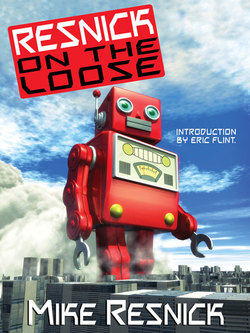Читать книгу Resnick on the Loose - Mike Resnick - Страница 4
На сайте Литреса книга снята с продажи.
ОглавлениеIntroduction
I met Mike Resnick long before I actually met him. This is not a tricky literary device, it’s the simple truth. Here’s how it happened:
Some years ago—many years now, thankfully—I was among the teeming ranks of those miserable unfortunates known by the oxymoronic term of “unpublished authors.” This is a state of affairs which is sorry enough in its own right. What makes it worse—far worse—is that there is no clearly defined route, mechanism, seminar, study group, transcendental meditation or mystical rapture through which the unpublished author can figure out how to get from the aforementioned oxymoronic state to that of an actual, you know, Author. Which is to say, someone who is actually Published—and in a recognized and accepted professional venue, to boot.
The problem isn’t lack of advice and counsel. Oh, no. Advice and counsel is ubiquitous. I would go so far as to say that those who advise unpublished authors on how to get published are as multitudinous as the walking, talking oxymorons themselves.
This is not surprising, since most of the people giving advice on how to get published to unpublished authors are themselves unpublished. At least 85%, at a rough guess—and if you’re looking simply at the instructors of creative writing classes, that figure climbs well past 95%.
But even the remaining counselors aren’t usually much help. True, they are genuine authors, in that they have indeed gotten published in one or more professional venues. The problem is that the great majority of them fall into one of two camps:
First, those who have indeed gotten published and can therefore legitimately call themselves “authors,” but…
Barely. As a rule, most authors have only published a handful of stories, and those consist almost entirely of short fiction. Half the time, probably, they’ve only published one or at most two stories.
So how much good advice can they really give you? Not much. In fact, in many cases their advice is more damaging than what you get from unpublished authors, because their status makes their advice seem weightier than it really is.
Of the remaining counselors, we are now talking about a very small percentage of people who try their hand at writing. These people are indeed successful authors and have gotten published many times. And yet…
Nine times out of ten, the best you can say for their advice is that you need to take it with a pillar of salt. That’s because the simple fact is that most successful authors don’t really understand very much about publishing. They got where they are from their own talent, usually combined with the services of a good agent—and it’s their agent who handles all their business.
Such was the state of affairs in which I was mired, those many years ago. Luckily for me, I subscribed to a magazine for unpublished authors called Speculations. (Which, sadly, is no longer being published.) At the time, the centerpiece of the magazine was a column titled Ask Bwana. And that’s how I met Mike Resnick. Mike was the author of that column, and issue after issue he would respond to questions sent in by wannabe authors with answers that for the first time in my experience made sense, were coherent, and provided me with a guide to action.
I didn’t actually meet Mike in person for another decade or so. That encounter happened in 2006 when he submitted a story to a magazine I was editing at the time, Jim Baen’s Universe. I bought the story, which went on to get nominated for the Hugo. It wasn’t long before we became friends, and about a year later I asked him to co-edit the magazine with me. Since then, Mike and I have edited an anthology together (The Dragon Done It) and will soon be collaborating on a novel (The Gods of Sagittarius). We are also both judges in the Writers of the Future contest.
My opinion of Mike’s knowledge of publishing in general and science fiction in particular hasn’t changed a bit over the years. There are very few people who understand the subject as well as he does, and none who know it better. As you will find out for yourself when you read this volume.
—Eric Flint
March, 201
